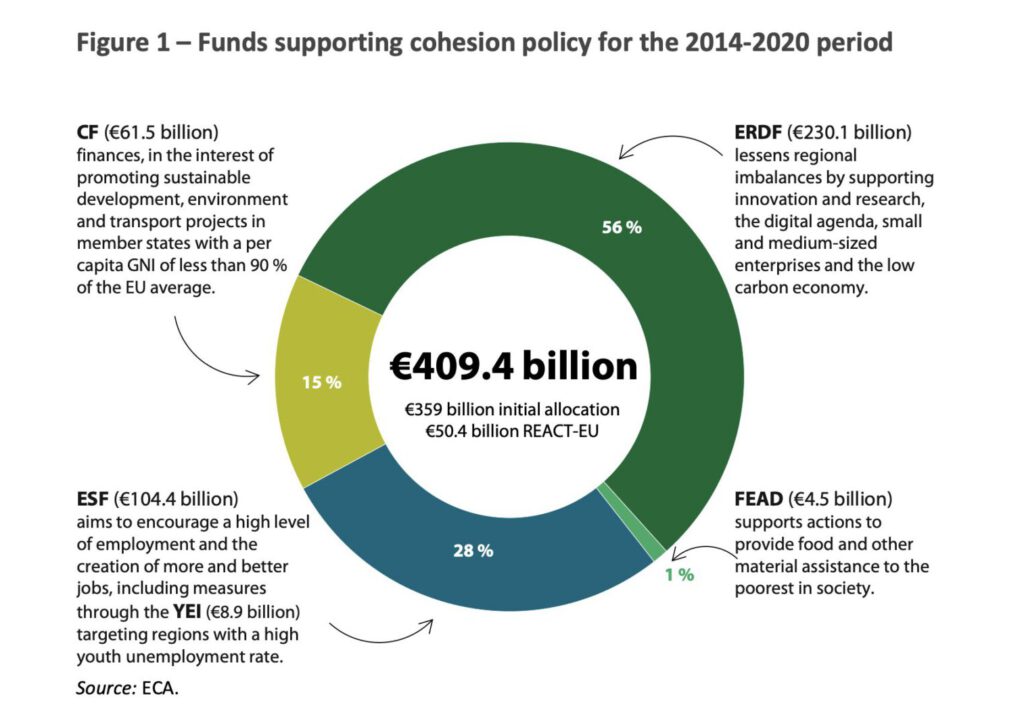
The EU has far-too-high error rates when it comes to cohesion spending. If shortcomings are discovered, even more money is given.
The European Union’s cohesion policy aims to reduce economic and social disparities between the countries and regions of the EU.
Switzerland also makes a substantial contribution.
Errors at all levels
However, the EU has not yet succeeded in significantly reducing the persistently-high error rate in cohesion spending, the European Court of Auditors warned this week. The shortcomings came to light in a recent analysis.
The controls of the European Commission and the EU countries are still inadequate at all levels, criticized the EU’s financial auditors. According to the auditors, the authorities in the EU countries could detect and prevent more errors.
Threshold value three times higher
For its part, the European Commission had not only underestimated the extent of the errors, but had also not made sufficient use of the options available to it to encourage the Member States to improve their expenditure management and control, the European Court of Auditors continued in its analysis.
In the multi-annual EU budget cycles 2007-2013 and 2014-2020, the overall error rate found in cohesion spending fell from 6 to 4.8 percent.
However, it had exceeded the permissible threshold of 2 percent every year, reaching a high of 6.7 percent in 2022.
Regulations disregarded
In the period under review, we are talking about a pot of 410 billion euros, which accounts for more than a third of EU expenditure. If the 4.8 percent error rate is applied to this amount, almost 20 billion euros could be saved.
The auditors emphasize that no conclusions can be drawn from the analysis regarding fraud and waste. However, they do provide an indication of the magnitude of the potential for improvement.

In recent years, most of the errors in cohesion spending have resulted from expenditure and projects that are not even eligible for funding , with recipients not complying with state aid or public procurement rules.
The EU auditors identified three main causes of errors: Shortcomings in administration, negligent or presumably deliberate breaches of regulations by the recipients of funds and problems with the interpretation of the regulations. Switzerland must therefore also pay attention to these three points.
Weaknesses at 40 out of 43 authorities
But that’s not all.
There is a three-tier system designed to prevent misuse.
Checks by the Member States’ administrative authorities are the first pillar of the control system, which aims to ensure the regularity of expenditure.
More than a third of the errors identified by EU auditors between 2017 and 2022 could have been prevented by these authorities through better controls.
Controls by the Member States’ audit authorities represent the second pillar of the system.
However, 40 of the 43 audit authorities inspected by the EU auditors were found to have weaknesses of various kinds and varying degrees. This already shows that a lot of money is being wasted.
The EU Commission – as the third pillar – bases its assessments on national controls that are only partially reliable, with some national authorities being more successful than others in detecting errors.
Even more funds as a reward
In the event of serious control deficiencies, the EU Commission can also make so-called financial corrections in order to counteract the negative effects of irregular expenditure on the EU budget.
However, such corrections have so far not resulted in any financial loss for the country concerned. Instead, the EU countries have even been able to use these corrections for additional projects, the financial auditors criticized.
This not only means that the deterrent effect of the corrections is lost, but also that there is no incentive for the EU countries to improve their control systems and thus avoid errors in the first place.
High risk identified
All in all, the FU auditors conclude that both the EU Commission and the EU countries could all improve their control of cohesion spending.
And they warn that the risk of irregular expenditure remains high.
Swiss taxpayers should therefore also take a closer look at those cohesion billions.
10.07.2024/kut./ena.




